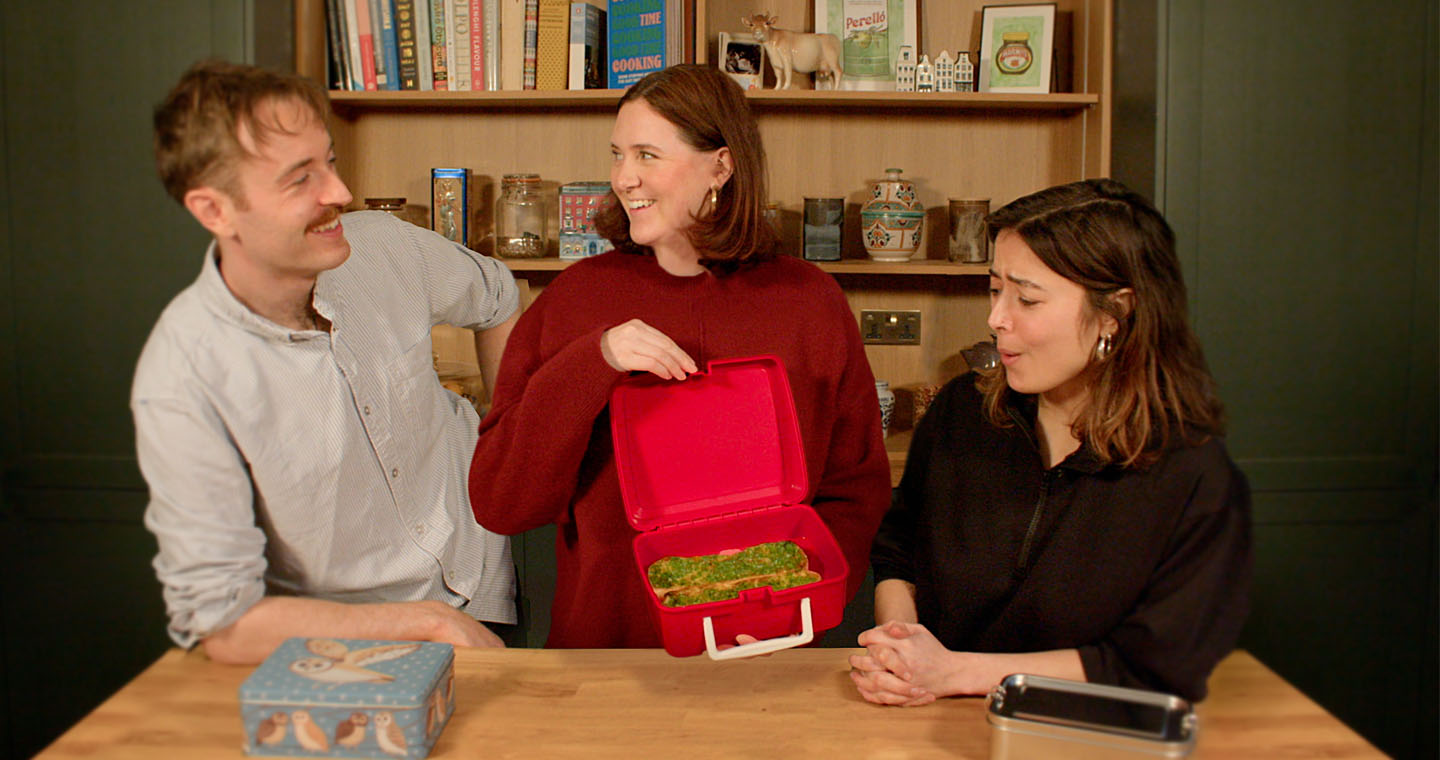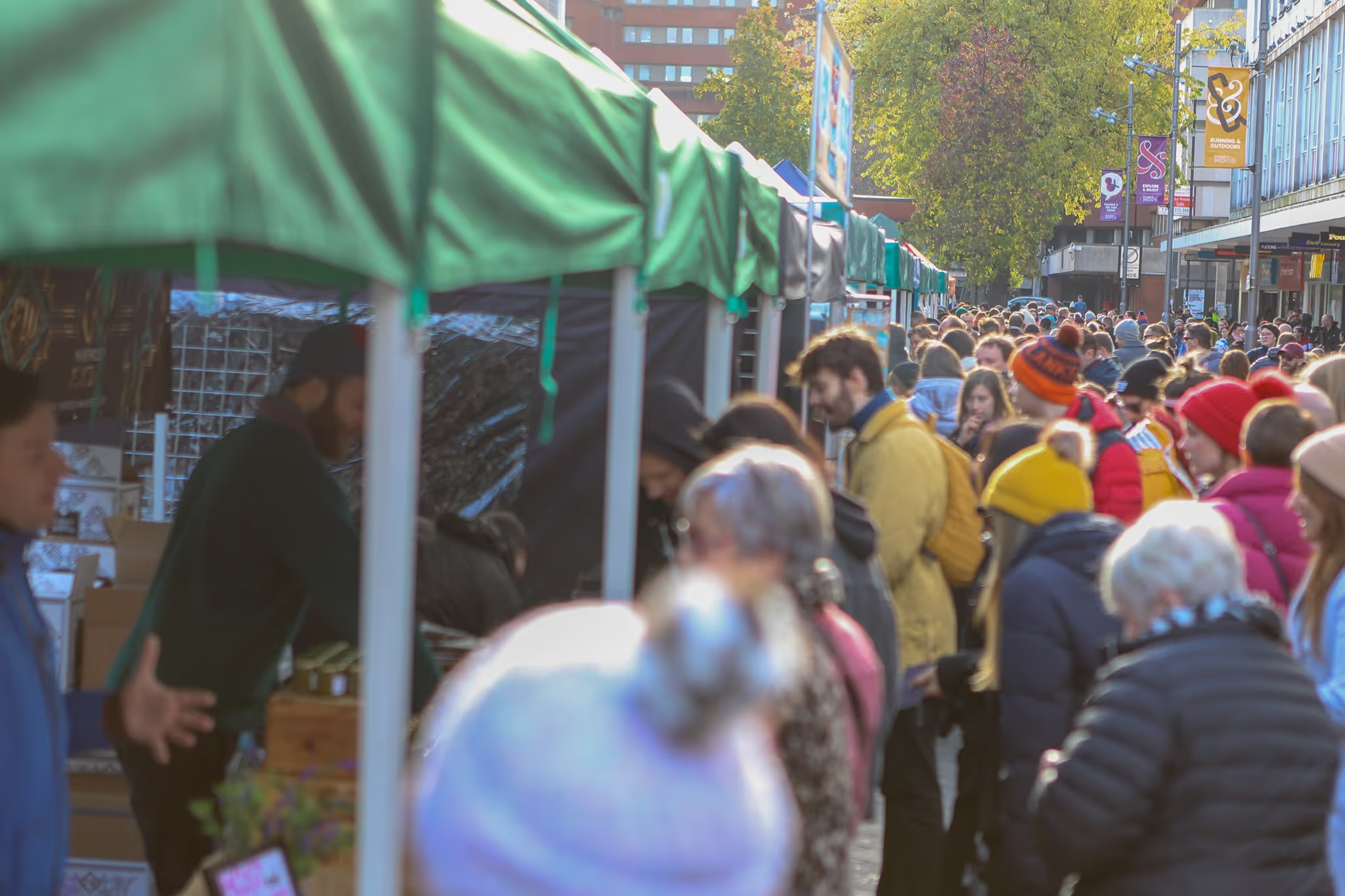The makers of legendary BBC2 panel show QI and its hit spin-off podcast No Such Thing As A Fish have developed a new piping hot podcast. Adding a generous dollop of bizarre and unusual facts to every meal, Lunchbox Envy launched last month and sees Manu Henriot (an ex chef) and Jack Chambers (a gastronome) gather around the table with chef & food writer Rosie MacKean to unpeel the culinary world, one ingredient at a time.
Fascinating and mouth-watering in equal measure, Lunchbox Envy will fill your brain as well your stomach. Packed with surprising food facts and bizarre culinary traditions, this new podcast answers the questions you never knew you had—like what happens when nuclear submarines run out of sausages, where in the world you can find blue bananas, and which country hosts an international testicle-cooking competition.
Lunching with the Elves is a unique experience because they're as interested in talking about their food as eating it. Finding out that the tip of asparagus is called a 'squib', or that scientists have patented a new type of seaweed that tastes like bacon, is what makes Manu, Jack and Rosie the perfect bread-fellows (the literal translation of the word ‘companions’)

As episodes start dropping, we spoke to Manu, Rosie and Jack about their ambitions for the podcast and British culture’s relationship with food.
Is food the big new sector in entertainment? From festivals to TV programmes, it seems to be everywhere at the moment.
MH - It’s nothing new, food shows have been around since the advent of broadcasting. I recently discovered America’s first ever cooking programme, The Betty Crocker Cooking School of the Air, which started on the radio in 1924, was hosted by the fictional Betty Crocker herself - and the chefs who voiced her remained anonymous for decades. Maybe we’ve already fallen at the first hurdle by revealing our real names on the podcast.
RM - I think maybe it’s so much more at the front of our brains than it was even 15 years ago because social media has made food a much bigger part of the global cultural zeitgeist. Everyone can now explore and learn so much more about it through different visual platforms and it drives that insatiable hunger (wahey) to eat and discover new foods.
JC - It’s interesting how much you can enjoy food vicariously, through screens or headphones. That’s got to be a part of its enduring popularity as entertainment. It’s also never going to run out - we’ve had centuries of spreading recipes and ingredients steadily around the world and there’s still so much to explore. That’s one of the benefits of globalisation that’s hard to deny: imagine if we all had to eat indigenous foods all the time…in Britain’s case, that would be porridge, raspberries, cobnuts, and mussels.
The podcast seems to feed two British obsessions: facts and food. Was this an intention from the start or did the development process evolve into it?
MH - The idea came about because Jack and I would talk about food non-stop at work. We were supposed to be on a lunch break from fact-hunting but we’d be saying things to each other like ‘did you know Birdseye sell enough peas every year to fill 40 Olympic sized swimming pools?’. And then Alex (our producer) introduced us to Rosie, and she’s so full of fantastic tips and trade secrets, and we realised we could make something whacky and useful.
JC - I think it’s not just Brits that love food and facts, it’s all humans. Food is said to be one of the primary human drives, along with sex and shelter. And at QI we believe there’s a fourth in ‘curiosity’, so it’s a match made in heaven. Maybe we should be developing a QI property show and Kama Sutra book too…
RM - To be a chef is to work in an inherently curious profession - in order to grow and improve you have to learn constantly, which is actually why I love it so much. So when Manu and Jack invited me onboard I jumped at the chance, because I knew it would be something that I’d want to listen to, and that loads of chefs like me would as well.
What’s the wildest culinary tradition you uncovered for this season?
RM - Somehow it doesn’t feel that weird to me, but I love the fact that in France, children were allowed a glass of wine with their school lunch until 1981.
MH - In some parts of Iceland blood pudding is served as a dessert with sweet rice pudding, and sometimes blood is whipped into a meringue - as a substitute for egg whites.
JC - The annual testicle-cooking tradition in Serbia is pretty barmy. Cooked testicles are a genuine culinary treat in many cultures, but the festival’s own website has a section under the FAQs called ‘Is this some kind of joke?’
Were there any food items that were just too weird to test, or are you game for anything?
JC - Garlic chocolate was pretty hard to swallow. I have gone in with a ‘try anything once’ attitude but that might come back to bite me.
MH - I agree, if it’s legal, I’ll try it! I actually kind of liked the garlic chocolate…
RM - I did struggle with one particular recipe that involved the sacrilegious desecration of one of my favourite ingredients - but you’ll have to listen to find out what.
Despite it being a basic need, and the options available on offer numerous, do you think the British are a bit detached from the history and production of food?
RM - Absolutely. I think some of that also has to do with our relationship with ingredients. The British menu isn’t shaped by the seasons as much as some other neighbouring countries, like Italy or Spain. We take it for granted that we can get what we want, when we want it, and don’t consider the fact that strawberries, for example, aren’t growing here in midwinter. So we stop questioning the origin of a product.
JC - The production element of food in particular is hidden from consumers a lot of the time. Take a Double Decker bar, for instance - it actually requires so much innovation and manipulation behind the scenes to make one, but we never see all that, we just have to pick it off the shelf. How would you even begin to make one at home?
MH - Jack’s right, for sure! It’s nearly impossible to trace the origins of a single food or dish because recipes and ingredients spread so quickly around the world. I think most people would be surprised or shocked about how their favourite foods are produced. Although not always in a bad way - it’s been lovely to learn more about companies that are trying to improve our global food chains to make them more equitable and sustainable.

I love that you also approach food from a chemistry and science aspect. Is there still a lot to learn about the properties of plants?
JC - Yes they are fascinating organisms! There are 60,000 varieties of rice alone, ten times as many as there are species of mammal. They are relatively under-studied. Don’t even get me started on fungi!
MH - No really, don’t get him started. There’s something I’ve always wanted to try called the ‘miracle berry’ that makes sour things taste sweet. Scientists have recently been looking out how it can make foods less metallic for people going through chemotherapy.
RM - I wish we could just do a whole series on herbs, they are my deepest love, and one of nature's finest moments.
Do you think you can influence buying habits, in the way that certain flagship cooking shows do?
JC - Nobody likes to imagine they don’t have free will, but the truth is we’re incredibly impressionable when it comes to food - did you know that according to researchers, hot chocolate genuinely tastes better if you drink it out of an orange mug? If that’s how easily swayed we are, I bet we can deploy our facts to get our listeners to shop more adventurously.
RM - I 100% agree - Lunchbox Envy is a gastronomic adventure, and I hope we can inspire people to try new things, as well as engage a bit of critical thinking when it comes to choosing ingredients, and mostly to enjoy their food even more!
MH - I think Lunchbox Envy will encourage people to look at what’s on their dinner tables in a new way, and definitely push them to try new foods. Not just new for them but new for the world…as we speak there are scientists out there synthesising new types of broccoli - how exciting is that!?
Lunchbox Envy is hosted by Audioboom, and available on any decent podcast platforms now.
www.audioboom.com/channels/5148299-lunchbox-envy

Mark O'Donnell
Featured What's On
Stay in the loop
Keep up to date with latest news, guides and events with the SALT newsletter.






